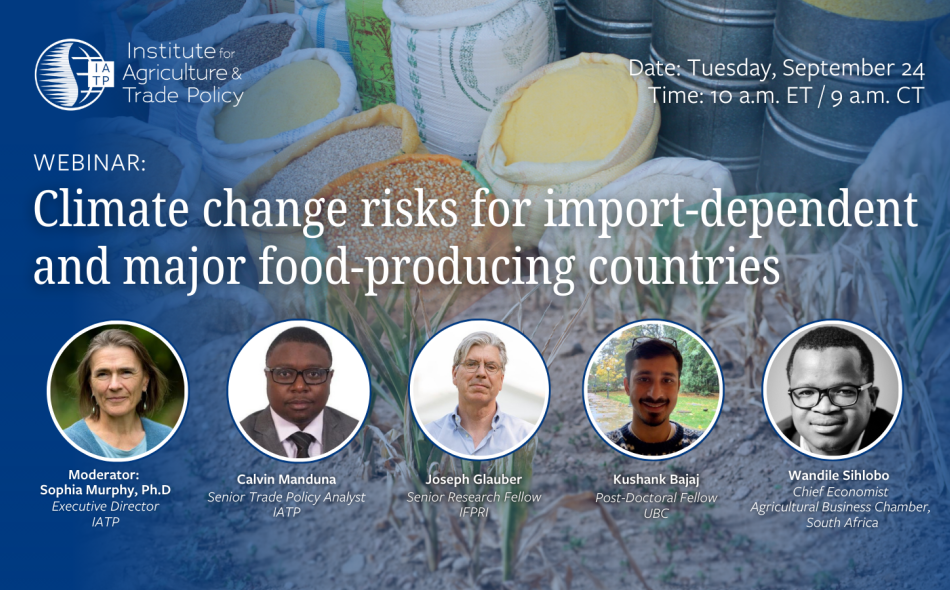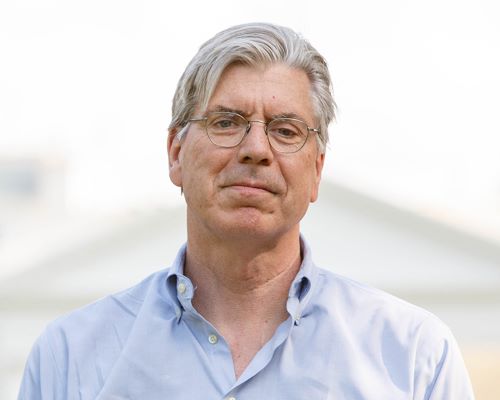
September 24th at 9:00am CDT - September 24th at 10:30am CDT
Climate change risks for import-dependent and major food-producing countries
Watch a recording of the webinar here.
Date & Time
Tuesday, September 24, 2024
9-10:30 a.m. CT/10-11:30 a.m. ET
Description
Extreme weather events are increasingly disrupting agricultural production and markets. However, agricultural trade can help address related food security concerns. With a focus on cereals — rice, wheat and corn — this discussion will explore the findings of a forthcoming IATP report, which sheds light on the complex relationships between trade and food security. We will also discuss how human-made disruptions, such as the war in Ukraine and bans on exports by some major food producers like India, further strain the global food supply chain and increase costs of food. While highlighting regional developments, we will cover how agricultural trade could help mitigate the risks of climate change and strengthen food security. Join academic experts and practitioners as they exchange ideas on the study and management of the ways in which climate change will affect agricultural production and trade and how these risks can be mitigated.
Presenter & Discussants

Presenter: Calvin Manduna, Senior Trade Policy Analyst, Institute for Agriculture and Trade Policy (IATP)
Calvin joined IATP as a senior trade policy analyst in December 2022. He has an interest in promoting environmentally sustainable agriculture approaches, strengthening rural livelihoods and shaping U.S. agriculture policy. He has worked on trade policy issues and regional integration for the past 15 years. He has covered trade negotiations with the European Union, the WTO Doha Round and U.S. trade negotiations. He began his career as a researcher with the Trade Policy Centre for Southern Africa (tralac) in South Africa. He has worked on trade policy issues based in Brussels and Geneva, as well as in developing country regions across Africa and the Caribbean. Before transitioning to nonprofit work, Calvin worked for the African Development Bank and the Caribbean Development Bank. As a trade policy consultant, Calvin has worked on various agriculture value chain and trade policy projects for various development partners, such as the EU and GIZ (Germany). Calvin holds a master’s degree in international law and economics from the World Trade Institute, Switzerland and an master’s in law from Howard University.

Discussant: Joseph Glauber, Senior Research Fellow in the Markets, Trade, and Institutions Unit, International Food Policy Research Institute
Joe Glauber is a Senior Research Fellow in the Markets, Trade and Institutions Unit. His areas of interest are price volatility, global grain reserves, crop insurance, and trade. Prior to joining IFPRI, Joe spent over 30 years at the U.S. Department of Agriculture, including as Chief Economist from 2008 to 2014. As Chief Economist, he was responsible for the Department’s agricultural forecasts and projections; oversaw climate, energy and regulatory issues; and served as Chairman of the Board of Directors of the Federal Crop Insurance Corporation. From 2007 to 2009, Joe was the Special Doha Agricultural Envoy at the office of the U.S. Trade Representative where he served as Chief Agricultural Negotiator in the Doha talks. He served as economic adviser at the “Blair House agreements,” leading to the completion of the Uruguay Round negotiations. Joe is the author of numerous studies on crop insurance, disaster policy and U.S. farm policy. In 2012, he was elected Fellow of the Agricultural and Applied Economics Association. He received his Ph.D. in Agricultural Economics from the University of Wisconsin and holds a bachelor’s degree in Anthropology from the University of Chicago.

Discussant: Kushank Bajaj, Agriculture Data Science Consultant and Post Doctoral Fellow, School of Public Policy and Global Affairs at the University of British Columbia (UBC)
Kushank is currently a data science consultant and a post-doctoral fellow at the School of Public Policy and Global Affairs at the University of British Columbia (UBC). His research explores the bi-directional relationship between food systems and climate change, focusing on both the systemic risks posed by climate change to food systems and the role of food systems in either mitigating or exacerbating climate change. He earned his Ph.D. from UBC’s Institute for Resources, Environment, and Sustainability, where he assessed climate risks in agri-food supply chains and their impact on food prices, particularly within Canada’s fruit and vegetable sectors. Currently, Kushank is involved in developing a global Digital Food Twin, a tool designed to better understand systemic risks and choke points within global food systems. Throughout his career, Kushank has led diverse research projects across environmental sustainability, climate risk and adaptation, and the agri-food and water sectors. His extensive cross-sectoral experience includes collaborations with academic institutions, government bodies and grassroots organizations across Canada and South Asia.

Discussant: Wandile Sihlobo, Chief Economist, Agricultural Business Chamber of South Africa (Agbiz)
Wandile Sihlobo is the Chief Economist of the Agricultural Business Chamber of South Africa (Agbiz) and the author of two books, “A Country of Two Agricultures: The Disparities, The Challenges, The Solutions” and “Finding Common Ground: Land, Equity and Agriculture.“ He is a Senior Lecturer Extraordinary at the Department of Agricultural Economics at Stellenbosch University and also a Visiting Research Fellow at the Wits School of Governance, University of the Witwatersrand, and a Research Associate at the Institute of Social and Economic Research (ISER) at Rhodes University. Sihlobo was appointed as a member of President Cyril Ramaphosa’s Presidential Economic Advisory Council in 2019 (and reappointed in 2022), having served on the Presidential Expert Advisory Panel on Land Reform and Agriculture from 2018. Sihlobo is a columnist for Business Day, The Herald and Farmers Weekly magazine. His weekly podcast, “Agricultural Market Viewpoint with Wandile Sihlobo,“ is available on all podcast platforms.

Moderator: Sophia Murphy, Ph.D., Executive Director, IATP
Sophia is a food systems and international economy expert with 30 years of professional experience, including as a board chair, program director, policy analyst and published writer. A policy expert and advocate who has focused on resilient food systems, agriculture and international trade, Sophia has worked primarily with civil society organizations, as well as with government, intergovernmental organizations and universities.
